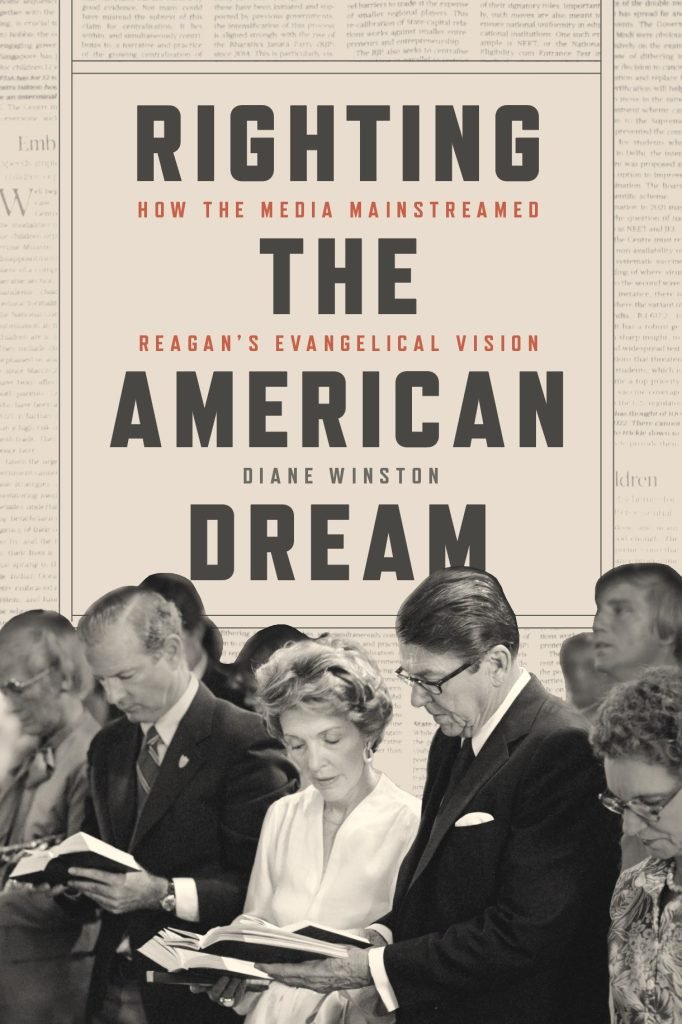

Diane Winston is Associate Professor of Journalism and Knight Center Chair in Media and Religion at the University of Southern California, Annenberg. This interview is based on her new book, Righting the American Dream: How the Media Mainstreamed Reagan’s Evangelical Vision (University of Chicago Press, 2023).
JF: What led you to write Righting the American Dream?
DW: Raised in a secular, Jewish family on Manhattan’s Upper West Side, I slid into Brandeis University without realizing it was a Jewish school. Until I started Harvard Divinity School, I had no idea that I belonged to a minority culture, and that many Americans had never met a Jew much less knew what modern Judaism taught.
HDS opened my eyes to the power of religion not only in individual lives but also in our society, especially our political orientations. Later, as a reporter, my beat was religion and my first job, at the “Raleigh News and Observer,” landed me in North Carolina just as televangelism and the Religious Right took off. Watching the rightwing evangelical stealth campaign take over both the Southern Baptist Convention and Raleigh’s local boards of education, county commissioners, etc. was a sobering experience. It also was one that most of the country—especially coastal and cosmopolitan elites—ignored.
Flash forward to 2012. I’d earned a Ph.D. in Religion, focusing on American evangelicalism, and written a book about the Salvation Army. As Knight Chair in Media and Religion at the University of Southern California, my research portfolio now encompassed media studies, and I edited several books on religion and the news and on religion and television. But I wanted to go deeper and triangulate my interests in religion, politics, and the news.
Why did I write about Ronald Reagan’s evangelical vision and its impact on the nation? What made me choose 1983 as an organizing principle for my analysis? I suspected 1983 was Reagan’s make or break year, I recalled the juicy political and cultural news of that year, and I had a hunch that something happened around that time that changed the nation’s ideological course. The result? Almost a decade of researching news clips and articles and reading political scientists, sociologists, US historians and communication scholars to understand the genesis of our current political, economic and cultural realities.
JF: In 2 sentences, what is the argument of Righting the American Dream?
DW: Righting the American Dream: How the Media Mainstreamed Reagan’s Evangelical Vision argues that the economic and cultural turmoil of the 1960s and 1970s ended postwar support for a secular, social welfare state and that Ronald Reagan’s evangelically-tinged political, economic, and religious vision, normalized by the news media, took its place.
JF: Why do we need to read Righting the American Dream?
DW: What accounts for Donald Trump’s popularity? The rise and public outburst of among other Christian nationalism? The greatest transfer of wealth that our country has ever seen? The Supreme Court decisions to ban abortion, expand gun rights, block student debt relief, circumscribe gay rights among other conservative rulings? Righting the American Dream: How the Media Mainstreamed Reagan’s Evangelical Vision demonstrates that today’s realities started with an ideological shift advanced by Reagan and circulated by the news media.
JF: Why and when did you become an American historian?
DW: In 1983, I became a religion reporter to better understand the role religion plays in society. By 1991, I had realized that deepening my understanding required historical study. I subsequently began a PhD program in Religion at Princeton University.
JF: What is your next project?
DW: I have several ideas about my next project and hope to commit to one, or some, soon.
JF: Thanks, Diane!